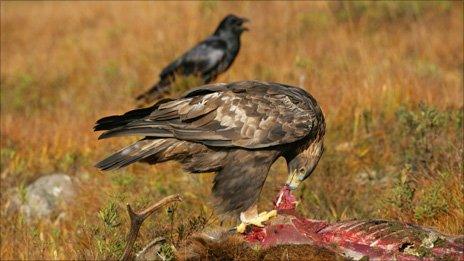Record bird poisoning incidents
- Published

The report said two golden eagles were among the poisoning cases confirmed by government testing
The RSPB has said more needs to be done to protect birds of prey after a study showed a record number of poisoning incidents.
Its report said 36 incidents had been confirmed by government testing.
Last year, poisoned birds included 21 buzzards, four red kites, two golden eagles and a white-tailed eagle which had been gifted to Scotland from Norway as part of a reintroduction programme.
A landowners organisation has said the figures are misleading.
As well as poisonings, the RSPB report also recorded nine incidents of illegal killings through shooting, nest destruction or the use of spring traps.
The charity warned that illegal killing can have "dire" consequences for the bird of prey populations, as many raptors were long-lived and had slow breeding rates.
It called for a range of measures to improve detection and prosecution.
Head of species and land management, Duncan Orr-Ewing, said: "We are lucky enough in Scotland to have some of the world's most majestic species of birds of prey, but unfortunately a significant number of people continue to break the law and undermine the recovery of their populations.
"This activity threatens other countryside industries such as tourism and undermines Scotland's reputation internationally."
The RSPB said incidents were recorded as poisoning if there was substantive evidence of the practice, such as the discovery of a victim or poisoned bait.
Some incidents were therefore recorded as poisonings even if no body had been discovered.
As well as the nine confirmed illegal killings by other methods, the report said there were also 19 "probable" cases of illegal killing where there was not enough evidence to prove it completely.
Many of the incidents detailed in the report were discovered by chance by members of the public in remote areas, mainly in southern, central and north-east Scotland and the Western Isles.
The report said while the majority of landowners and their employees acted responsibly and within the law, a "significant number" of individuals or estates persisted with the "outdated practice" of illegal killing.
Mr Orr-Ewing said his organisation would continue to work with responsible landowners, but warned: "All estates now need to provide tangible evidence that they are taking positive action on the ground to safeguard protected species and giving firm instruction to their employees to obey the law."
'Full-time officers'
However, the landowners' organisation, the Scottish Rural Property and Business Association (SRPBA) said the figures were misleading.
A spokesman said: "The official government report on the illegal poisoning of birds of prey for 2009, published in March 2010, shows the level has stayed the same for the last three years with the exception of 2008 when there were 16 incidents.
"In 2006 there were 34 incidents.
"There is ample legislation in existence to deal with this problem and we support the full weight of the law being brought to bear on those using illegal poisons."
The RSPB report proposed a range of measures, such as full-time wildlife crime officers for each police force, a review of penalties available to the courts for wildlife crime and specialist environmental fiscals to prosecute such offences.
- Published20 July 2010